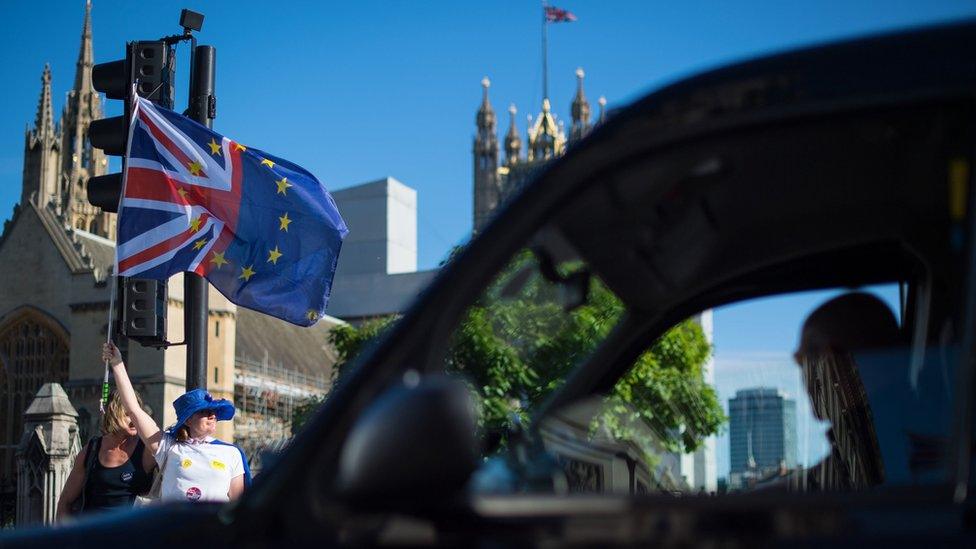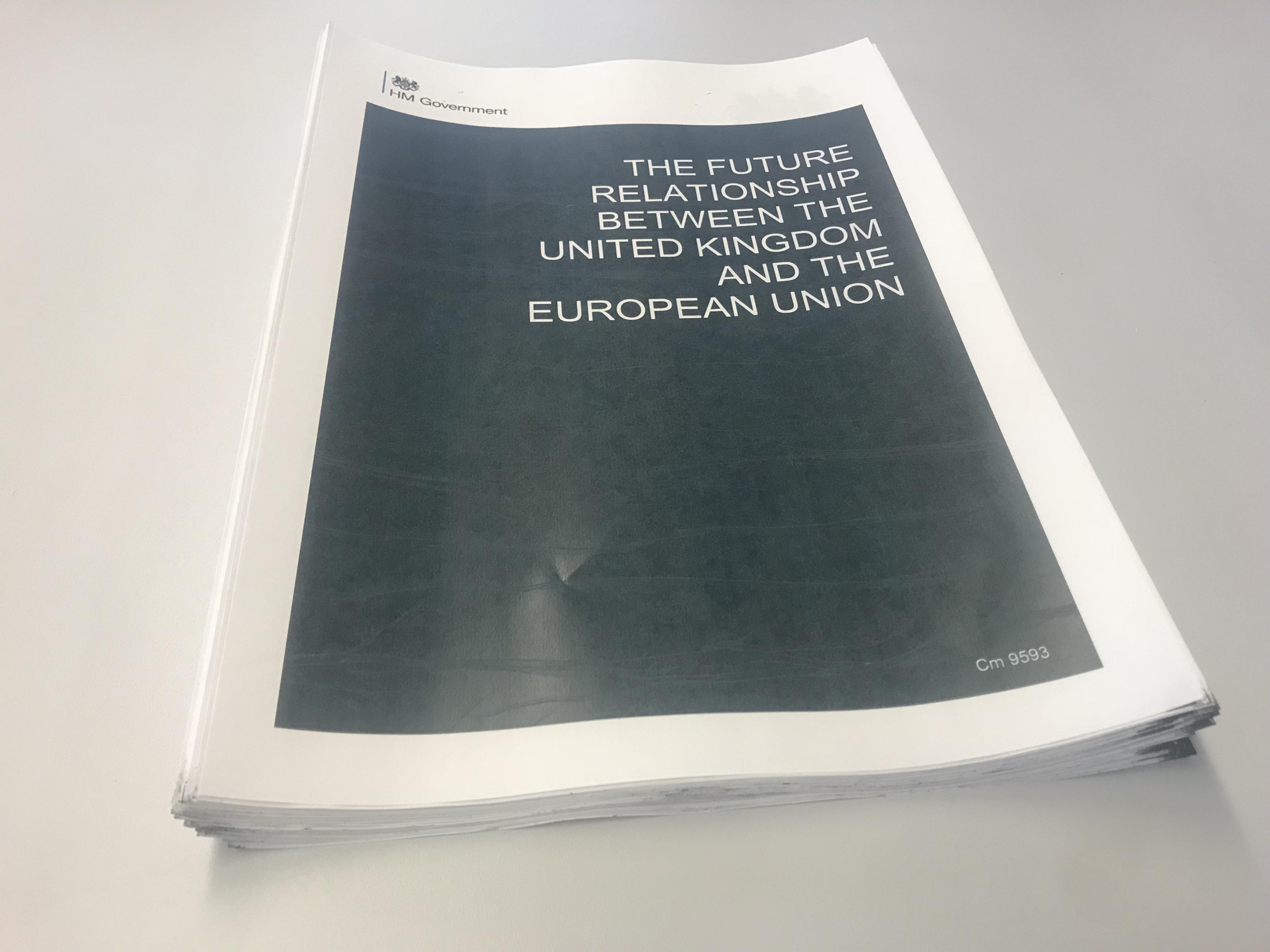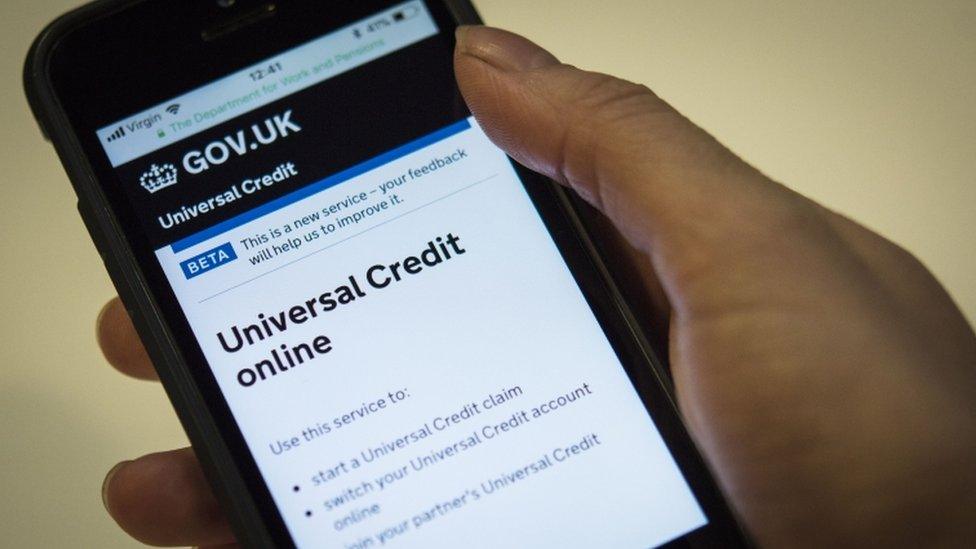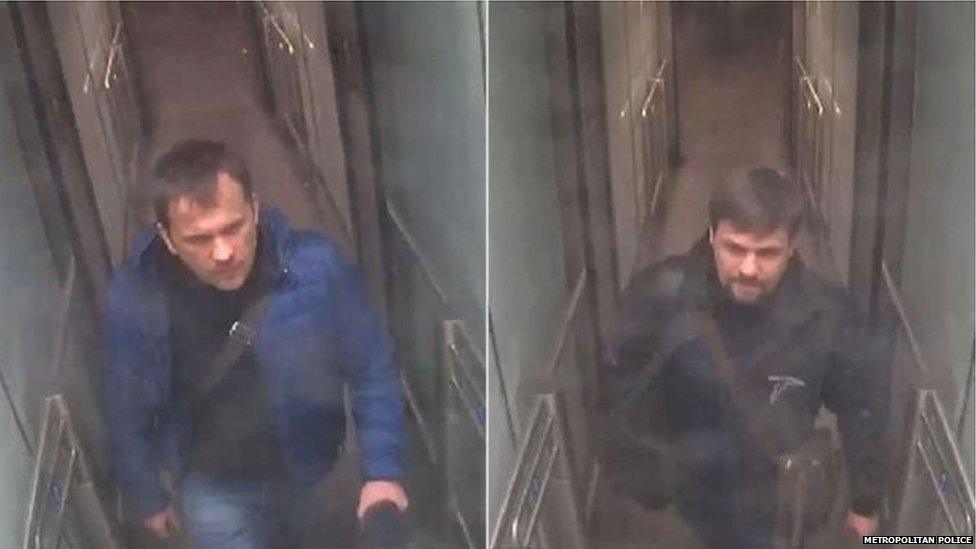Week ahead in Parliament
- Published
- comments

Looking at the parliamentary agenda for the week ahead, it's hard to avoid the idea that the government's main priority was to avoid any flashpoints in the run-up to the party conference season; there's a lot of heavy duty Brexit legislation to be done, but the Commons, in particular will hold general debates on assorted issues, while the promised bills on migration and agriculture and much else are nowhere to be seen.
So, as with this week, any Westminster dramas will have to come from urgent questions or ministerial statements: "events, dear boy, events..."
Perhaps the one to watch is the Trade Bill, external in the House of Lords - not so much for this Tuesday's second reading debate, but for the detailed debate which will follow later in the autumn; the pro-EU majority in the Upper House will almost certainly attach an amendment requiring the UK to join a customs union with the EU (and probably many other amendments, too) and send it back the Commons, so forcing a vote on a highly contentious issue at what may well prove to be a critical moment in the progress of Brexit.
And keep an eye on the two Labour MPs "no confidence" by their local parties; Joan Ryan and Gavin Shuker. They probably won't be the last, so what will they do? Resign their seats or the Labour whip?
Here's my rundown of the week ahead:
Monday 10 September
The Commons meets (2.30 pm) for Education questions - and then expect the usual clutch of post-weekend urgent questions and ministerial statements to follow. One likely subject is the Treasury decision on National Insurance for the self-employed.

The main event is a general debate on legislating for the EU Withdrawal Agreement - based around the government White Paper, external setting out where and how changes to the law will be made to implement the withdrawal agreement. It also discusses how EU law will continue to have effect in the UK during transition.
Meanwhile, in Westminster Hall (at 4.30 pm), there's a Petitions Committee debate on e-petition 223729, external calling on the government to rescind Article 50 "if Vote Leave has broken electoral laws regarding the 2016 referendum".
On the committee corridor, the Housing, Communities and Local Government begins taking evidence (4.15pm) for a new inquiry into high streets and town centres in 2030.
In the Lords (2.30pm) the main event is detailed committee stage debate on the Ivory Bill, external - where there are a number of Conservative backbench amendments aimed at focusing the ban on ivory trading on poached ivory, and exempting ivory created before 1918. These may be pushed to a vote, with Labour peers whipped to oppose them.
There will also be a short debate on the implications of the decline in the use of cash for the "poverty premium" payable by the most financially disadvantaged.
Tuesday 11 September
Commons business opens (11.30 am) with Treasury questions....perhaps followed by more statements or urgent questions.
The day's Ten Minute Rule Bill would make administrators and moderators of some online forums responsible for content published there - Labour MP Lucy Powell has assembled a formidable cross-party coalition behind her measure which is about tackling online hate, fake news and radicalisation.
Backers include former Conservative ministers Nicky Morgan, Robert Halfon, Bob Neill, and Anna Soubry, plus Jacob Rees-Mogg, as well as Labour MPs like David Lammy, Stella Creasy, Jess Phillips, Ruth Smeeth and Luciana Berger.
The bill aims to pressure social media giants to take more responsibility for hate on their sites, but also targets moderators and administrators of online forums and groups, making them legally liable for any hate or defamation within their group or page if they do not remove it within a reasonable time frame. The bill would also ban 'secret groups' on sites like Facebook.
Then MPs turn to the report stage debate on the Counter-Terrorism and Border Security Bill, external - the point at which any MP can propose changes.
There is some quite high-powered action here: the Home Secretary, Sajid Javid is adding an amendment to create a new offence of entering, or remaining in, an area outside the United Kingdom that has been designated to protect the public from terrorism.
And he also wants to change the existing offence of viewing on three or more occasions internet documents or records containing information likely to be useful to terrorists - this amendment would remove the requirement for the material to be viewed three or more times. There are Labour amendments to make UK membership of the the European Arrest Warrant system for people suspected of terrorist offences a negotiating objective in the Brexit talks, and to delete provisions in the Terrorism Act 2000 which restrict access to a lawyer.
In Westminster Hall proceedings open (9.30am) with a Backbench Business Committee debate on human rights abuses and UK assistance to Bahrain led by Labour MP Andy Slaughter.

The debate at 11am from the Labour MP Dan Carden may have quite a number of echoes in the coming week: he's raising the rollout of Universal Credit in Liverpool - Mr Carden, who represents the deprived Walton constituency, will highlight concerns from his advice work and from local Citizens Advice Bureaux, that the switch to the new super-benefit could leave many people destitute. In particular, he will relay warnings from local landlords that they will no longer be prepared to let properties to people on UC, because so many are falling into rent arrears.
Other debates include funeral poverty (Emma Lewell-Buck at 2.30 pm) and Trans-Pennine rail travel and delays from Kevin Hollinrake (4pm) and finally, at 4.30pm, Labour ex-minister Liam Byrne leads a debate on the final report of the Economic Justice Commission, external. Mr Byrne describes the report as "a magnificent, parliament-sized package of radical reform that reconnects wealth creation with social justice". He says the debate will discuss the problems revealed by the commission and the bold solutions they suggest because the status quo is just not an option.
On the committee corridor watch out for the Health and Social Care Committee's latest evidence session on antimicrobial resistance (2.30 pm) following on from this week's alarming hearing, with a series of medical experts followed by Health Minister Steve Brine.
In the Lords (2.30pm), the main event is the second reading of the Trade Bill, external - denied the opportunity to wreak Remain havoc on the Taxation (Cross Border Trade) Bill last week, because it was a money bill, which peers are not allowed to touch, their lordships will be able to sink their remaining teeth into this Brexit measure - but not in this debate.
The fun will come after the conference season, when committee and report stage debates take place. Trade Minister Baroness Fairhead leads for the government.
Wednesday 12 September
Commons opens (11.30am) with questions to David Lidington, the Chancellor of the Duchy of Lancaster and Minister for the Cabinet Office, followed at noon by Prime Minister's Questions.
The day's Ten Minute Rule Bill, from the Conservative, Rebecca Pow, to hold a public consultation on innovative technologies and energy consumption in households and commercial properties and to report on responses to that consultation and steps to be taken to encourage the development of innovative technologies to reduce energy consumption.
Then comes a general debate on the Salisbury incident - despite concerns that the debate could focus on the guilt or innocence of the two people named as Russian intelligence agents by the prime minister. The chair will be on the alert to shut down any speeches that touch on sub-judice issues - but the escalating crisis with Russia should provide plenty to talk about.

Police released CCTV showing the two suspects arriving at Gatwick Airport on 2 March
In Westminster Hall, Conservative veteran Sir Bill Cash leads a debate (9.30am) on HS2, the controversial high speed rail scheme. He voted against the government's HS2 Bill and opposes the scheme, which he has warned will "leave an iron scar" across Staffordshire.
The debate at 11am on planning permission for shale gas exploration raises another subject which may become a Westminster Hall regular - Conservative MP Lee Rowley's North-East Derbyshire constituency is one of the areas where fracking is being considered.
He will argue that recent consultation proposals from the government would loosen planning rules for both exploration and actual fracking. In particular, they would reduce the input local residents have on nearby planning applications, which he believes would be a mistake given the controversy over fracking, so he will urge the government to think again.
Other debates include the peace process in Colombia. led by Labour's Chris Bryant at 2.30 pm; veterans in the criminal justice system from Madeleine Moon at 4pm, and, finally preservation of historic battlefields (4.30 pm) the Conservative ex-minister and historian Chris Skidmore, author of a book on the battle and more recently a biography of Richard III, who wants to ensure the protection of the site of the battle of Bosworth.
Bosworth, he will argue, was one of the most important battles in British history, leading to the end of the Plantagenet dynasty and the birth of the Tudor dynasty.
He says: "The battle site is remarkably preserved - as recent archaeological investigations have shown, there is still much evidence buried beneath its fields. As the discovery of Richard III's remains under the tarmac of a car park in Leicester demonstrate, our hidden past can unearth remarkable finds. Yet this planning application for a huge driverless car testing track due to be decided on 25 September threatens to tarmac over a historic battlefield - setting a dangerous precedent for battlefields and archaeological heritage across the country that deserves to be protected for future investigation."
The debate topic has deliberately be left broad, so other MPs will be able to talk about their battlefields under threat, such as Tewkesbury.
In the Lords (3pm), the peers continue with on the detail of the Ivory Bill - before moving onto a short debate on the ability of women's centres to improve outcomes in the justice system - led by the Bishop of Gloucester, the Rt Rev Rachel Treweek.
Thursday 13 September
The Commons opens (9.30am) with International Trade questions, and Women and Equalities questions, followed by the weekly Business questions to the Leader of the House, Andrea Leadsom.
Then comes a general debate on proxy voting, external. There's a bit of backstory to this, because of continuing anger over the breaking of a pairing arrangement with the Lib Dem MP Jo Swinson during a crucial vote on the EU Withdrawal Bill. The House has already voted in favour of a proxy voting system and this debate is intended to be a taking of the voices on how it should work. The Leader, Andrea Leadsom, has already promised that an amendment to Commons rules will follow.
In Westminster Hall (1.30pm) there will be a debate on deaf children's services, led by the Labour MP Jim Fitzpatrick.
In the Lords (11am) peers hold a series of balloted debates: first up is Lord Harries' debate on the Transparency of Lobbying, Political Campaigning etc Act and its effect on third party election campaigning.
Following is a topical short debate on the impact of anti-Semitism in the UK, then the second balloted debate on the 40th anniversary of first IVF conception, led by the former chair of the Fertilisation and Embryology Authority, the Crossbencher, Baroness Deech.
Last business is a short debate on international declarations of genocide or crimes against humanity.
And with that, Parliament rises for the conference recess - MPs and peers return to action on 9 October.